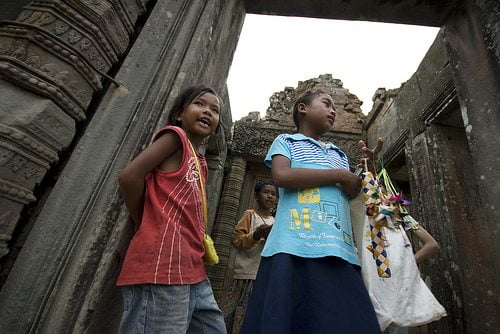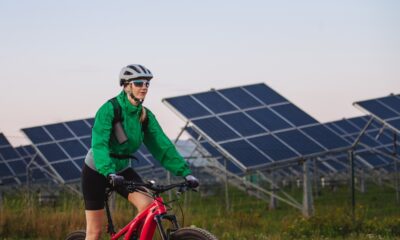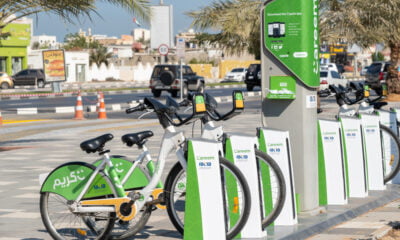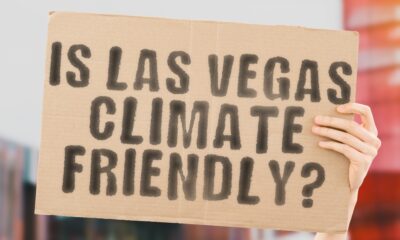

Economy
Responsible tourism means helping communities to thrive
In July, I wrote about the importance of spending your holiday and travel money locally. It’s a principle I always hold to, and other than in times of desperation (and they come) means that I avoid the logos and brands I am so easily dazzled by in London.
But until recently that idea of ‘local’ seemed a core enough value; a threshold to mark by that was alone a valid marker. A recent trip in Cambodia prompted me to consider the fact that it is important to think about where locally to spend it, and it is not always on individuals.
When local children are looking at you with big wide eyes and offering their wares, be they postcards, handmade crafts or drinks and refreshments, it is easy to presume that it is far better to share your cash with them than a hotel or restaurant.
The latter establishments have walls and roofs and systems, so are less in need, right? Sometimes the kids don’t even have shoes.
It’s annoying, but what harm is a little coin or two. Or “one dollarrrr” as they squeal in a hybrid Khmer-American accent. Aside from the constant tugging and tussling being irritating, there are other reasons not to allow yourself to be won over.
Money talks, and the message it sends to children isn’t always a positive one. Especially in areas where the money is lacking, and what prosperity there is is not held in the hands of local people but corrupt leaders and owners (or the ‘big boss’ as a tour leader referred to this caricatured but all too real layer of society, visible if not in person but by what is lacking for the people).
In Cambodia, approximately 32% of the 14 million strong population lives under the poverty line of one US dollar per day.
If a child manages to sell five or 10 of their goods per day, an easy thing in the bustling tourist spots of say the extensive Angkor temples where over two million people visit every year, they are already rivalling the average monthly salary.
An adult’s salary at the age of seven means that the idea of school and education suddenly becomes less appealing and less relevant, especially as that schooling can come at a significant cost once documentation and uniform comes into the equation. Only 10% finish secondary education, and the $450 annual fee for university makes it prohibitive.
It’s fine for a few years, but once they reach 15 and they cease to be so cute and able to tug at tourists’ heartstrings, they find themselves in a less alluring position. No education, no language skills other than “you buy, one dollar” and no possibility of supporting a family, any opportunities of a better life are suddenly quashed. It becomes difficult to make that average salary and they become another statistic under the poverty line.
In places where compulsory education is less enforced, parents who themselves may not be educated also become blinded by the green fairy (I’m talking dollars, not absinthe).
Their cute children reach teenage years, stop earning money from tourists to supplement the family income and so resources plummet. The easy option for them is to have more children, and so they do, and send these to undertake a similar task.
It’s not uncommon for families to have upwards of 12 children in Cambodia and given that care and education are already overstretched and subject to vast levels of corruption, the family is again plunged lower down the ladder of development. A long-term perspective is not easy to take when you are hungry.
The businesses we speak of, with walls et al, are hardly evil bastions of capitalism. Buying a coffee from a cafe in Siam Reap isn’t buttressing Starbucks’ profits. We need to get out of the mindset of ‘business bad, individual good’ and focus on the longer lens and what will enable communities to thrive.
Blue & Green Tomorrow’s central tenet of sustainable and ethical investment is applicable not only at a macro level, but comes down to those individual holiday purchases.
When you invest that dollar in your pocket, that one single dollar, it can make a difference. Be sure you are investing it in a future that will genuinely benefit both the local community and the cute little kid.
Francesca Baker is curious about life and enjoys writing about it. A freelance journalist, event organiser, and minor marketing whizz, she has plenty of ideas, and likes to share them. She writes about music, literature, life, travel, art, London, and other general musings, and organises events that contain at least one of the above. You can find out more at www.andsoshethinks.co.uk.
Further reading:
Sustainable tourism: people power and destination stewardship
Humans, nature and responsible tourism: chronicles of an Italian holiday
A responsible tourist considers local communities
Sustainable tourism can help tackle the world’s biggest challenges, says UN official


 Environment12 months ago
Environment12 months agoAre Polymer Banknotes: an Eco-Friendly Trend or a Groundswell?

 Features11 months ago
Features11 months agoEco-Friendly Cryptocurrencies: Sustainable Investment Choices

 Features12 months ago
Features12 months agoEco-Friendly Crypto Traders Must Find the Right Exchange

 Energy11 months ago
Energy11 months agoThe Growing Role of Solar Panels in Ireland’s Energy Future




























